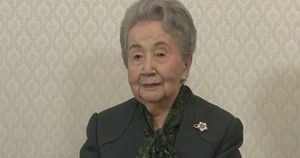President-elect Donald Trump has chosen Robert F. Kennedy Jr. to lead the Department of Health and Human Services (HHS), a move that's stirring quite the pot among health professionals and political figures alike. This nomination is particularly contentious due to Kennedy's long-standing views on vaccines and his endorsements of various conspiracy theories surrounding health and safety.
Kennedy, 70, is not just any random choice; he's from the illustrious Kennedy family, the son of Robert F. Kennedy and the nephew of John F. Kennedy, whose leadership and tragic assassination have left indelible marks on American politics. An environmental lawyer by profession, Kennedy has spent decades championing several health-related causes; unfortunately, many of them have sparked debates, especially his skepticism about vaccines, which he controversially attributes to his own health issues.
Under his stewardship, the HHS will oversee significant health agencies like the Food and Drug Administration (FDA) and the Centers for Disease Control and Prevention (CDC), roles described by experts as pivotal to public health, particularly during times of crises like the COVID-19 pandemic. Many public health experts and advocates are voicing alarm bells, fearing possible ramifications if Kennedy's controversial views gain traction within these powerful organizations.
Lawrence Gostin, director of Georgetown University's O'Neill Institute for National and Global Health Law, expressed his grave concerns: "To say Robert F. Kennedy Jr. is unqualified is a considerable understatement. He has spent his entire career fomenting distrust in public health and undermining science at every step." This sentiment echoes through the halls of many health offices across the nation, with professionals worrying about Kennedy's potential to influence health policies.
Establishing his reputation as a vocal opponent of vaccinations, Kennedy famously claimed vaccines cause autism, a theory debunked by numerous scientific studies over the years. His views don't stop there; he’s also made false assertions about the safety of fluoride, linking it to various health risks without scientific backing. Critics argue this kind of misinformation can heavily sway public perception and behavior when it matters most.
Since his endorsement of Trump for the 2024 election, following his prior bid as an independent candidate for the presidency, Kennedy has proposed ambitious plans to "Make America Healthy Again," which intriguingly includes eliminating certain food additives and cleaning up the nation's environmental hazards. While these are noble goals on the surface, many worry his unconventional approach to health care could undermine established scientific principles.
Kennedy’s critics are particularly uneasy about the prospect of him influencing FDA or CDC leadership. They fear he might oversee appointments of officials who share his anti-vaccine beliefs—an alarming thought, especially considering the increasing rate of vaccine-preventable diseases like measles and mumps. Dr. Paul Offit, who has had extensive involvement with CDC and FDA vaccinology committees, emphasized the dread among health leaders: "It's like having someone who doesn’t believe in gravity being the head of NASA."
Such sentiments fuel worry over HHS’s ability to set effective public health standards. Would Kennedy outright remove vaccines from the market? While experts believe there are checks and balances preventing outright bans, they remain apprehensive about public health communications and the potential for cherry-picking data to undermine the safety and efficacy of vaccines.
Kennedy himself insists he won't remove vaccines but has been vague about what changes he would initiate within the HHS. Still, the fear is palpable. Katelyn Jetelina, an epidemiologist and founder of the newsletter Your Local Epidemiologist, aptly noted, "My biggest concern is the disinformation amplified by someone like Kennedy who has the potential to drive confusion and anxiety among the public on health issues."
While there are glimmers of hope around some of Kennedy’s policies related to nutrition and environmental health—he’s promised to ban harmful food additives and push for cleaner food sources—many remain skeptical of his ability to enact real change, especially with his contentious track record. Public health professionals note the importance of meaningful reform but worry this could be overshadowed by his other views.
Trump's nomination of Kennedy has also raised reactions among Republican senators. Some, like Bill Cassidy of Louisiana, expressed cautious optimism about Kennedy's commitment to public health, citing his focus on food and transparency as beneficial. On the contrary, other Republicans, such as Senator Susan Collins of Maine, are slightly worried, calling out some of Kennedy's statements as alarming.
Even Democrats are ringing the alarm bells. Senator Ed Markey referred to Kennedy as "dangerous, unqualified, unserious," and Patty Murray of Washington voiced concerns about what this appointment might mean for progress on public health issues, stating, "Putting someone like this at the helm could set America back significantly, and the consequences are life or death issues."
Market reactions also hint at the general unease following the announcement. Shares of major vaccine developers, including Pfizer and Moderna, reportedly dipped by as much as 2% following Kennedy's nomination. Investors are evidently nervous about the potential shift away from scientific consensus, fearing what this could mean for vaccine industries.
Conclusion: The nomination of Robert F. Kennedy Jr. to head the HHS is sparking significant discourse, reflecting deep divisions on vaccine safety and public health policies. While some express hope for reform, the overarching concern remains: How will Kennedy's controversial views shape the future of American health? The Senate confirmation process promises to be contentious, echoing the broader national debate on trust, science, and health care priorities in the age of misinformation.



